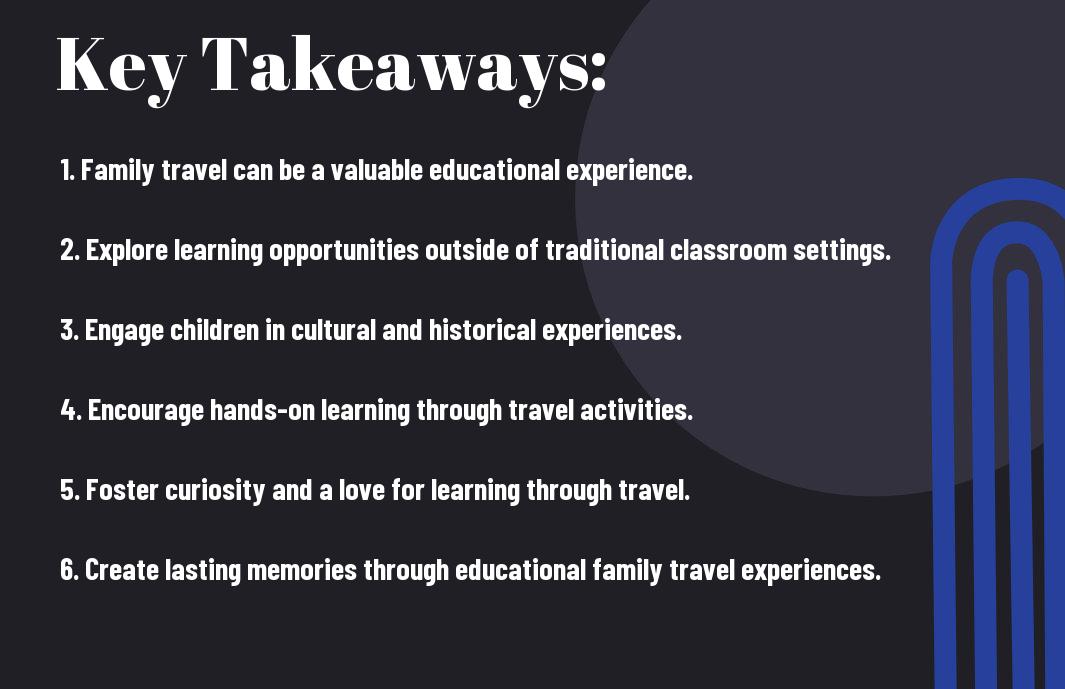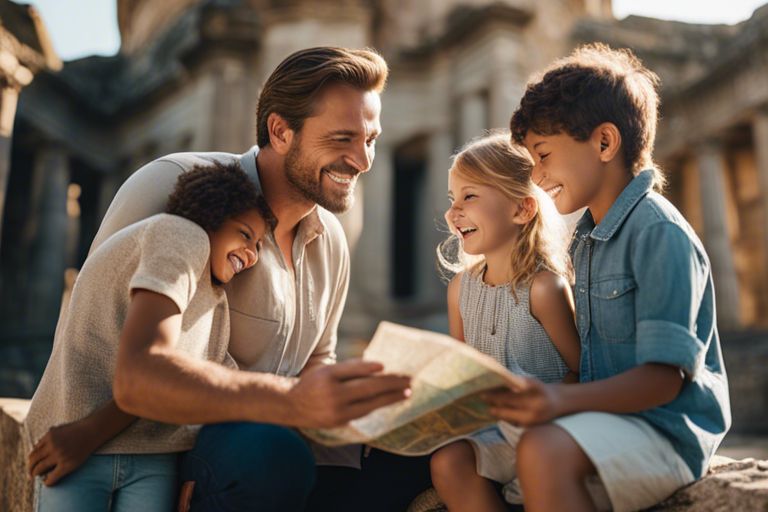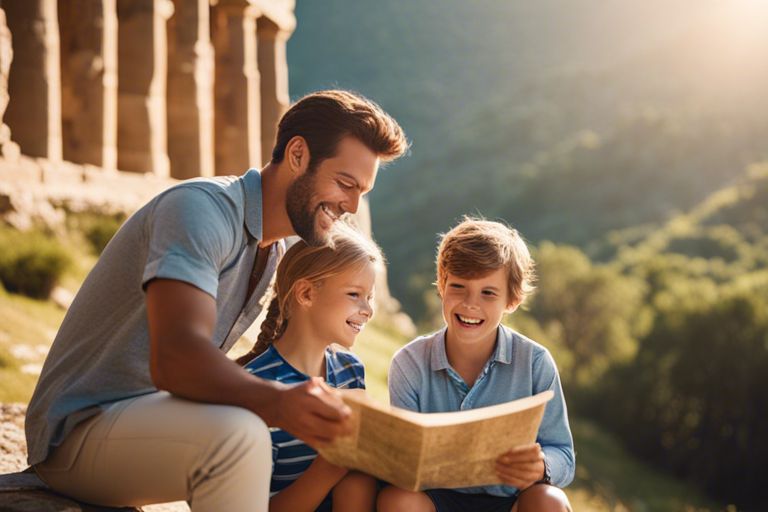Embarking on a family trip can be enriching and educational beyond the confines of a traditional classroom. By incorporating educational elements into travel experiences, families can turn vacations into valuable learning opportunities for their children. In this blog post, we will explore the benefits of educational family travel, as well as provide tips and ideas for creating a fun and educational experience that goes beyond the typical tourist attractions. From history and culture to science and nature, family travel has the potential to ignite a passion for learning and exploration in children, making it a truly transformative experience.
Key Takeaways:
- Integrate learning into travel: Plan visits to historical sites, museums, and cultural landmarks to make travel a fun and educational experience for your family.
- Engage in hands-on experiences: Encourage your children to actively participate in activities that provide a deeper understanding of the places they visit, such as cooking classes or language immersion programs.
- Use travel as a tool for cultural understanding: Expose your family to different cultures, traditions, and customs to broaden their perspectives and promote empathy and tolerance.
- Make learning fun: Incorporate games, quizzes, and storytelling into your travels to make learning engaging and enjoyable for your children.
- Encourage curiosity and exploration: Foster a sense of curiosity and exploration in your children by allowing them to ask questions and discover new things during family travel experiences.

Planning Your Educational Journey
Assuming you’ve made the decision to turn your family travel into a fun and educational experience, the next step is to plan your educational journey. Planning is crucial in order to maximize learning opportunities and create a well-rounded experience for your family. Not only does it involve choosing the right destinations, but also incorporating learning objectives into your travel itinerary.
Choosing Educational Destinations
On your educational journey, it’s important to select destinations that offer a range of educational opportunities. Consider places with historical significance, museums, cultural landmarks, and natural wonders. By exposing your family to diverse learning environments, you can broaden their knowledge and understanding of the world.
Incorporating Learning Objectives
Educational travel presents an opportunity to align learning objectives with real-world experiences. Identify your family’s educational goals and tailor your travel plans to meet those objectives. Whether it’s learning about history, art, science, or language, incorporating educational activities into your itinerary can make the journey both enriching and enjoyable.
A well-planned itinerary can include visits to historical sites, interactive museum exhibits, language immersion activities, and hands-on science experiments. By weaving these educational experiences into your family travel, you can create lasting memories while fostering a love for learning.

Educational Activities for Family Travel
To make family travel both fun and educational, it’s important to incorporate activities that promote learning beyond the classroom. Utilizing Playing and Learning Beyond the Classroom can significantly enhance children’s knowledge and understanding of the world around them.
Historical Landmarks and Museums
The exploration of historical landmarks and museums offers a unique opportunity for children to immerse themselves in the past and gain a deeper understanding of different cultures and societies. Visiting these sites allows families to witness historical events come to life and to appreciate the significance of these locations firsthand.
Nature and Wildlife Exploration
With the decline in outdoor activities and increased screen time, it’s more important than ever for families to engage in nature and wildlife exploration. By exposing children to the wonders of the natural world, families can foster a greater appreciation for the environment and a deeper understanding of complex ecosystems.
Museums that focus on nature and wildlife can provide hands-on experiences and educational exhibits that highlight the importance of conservation and biodiversity. These interactive opportunities can inspire children to become advocates for environmental stewardship and wildlife preservation.
Making Learning Fun on the Go
For families, turning travel experiences into educational opportunities can make trips even more enriching. Our Trip Down to the Bay: A Model of Experiential Learning by the National Association for the Education of Young Children provides a great example of how family travel can be transformed into a fun educational experience.
Interactive Games and Challenges
On long road trips or flights, interactive games and challenges can keep kids engaged and excited about learning. For example, playing license plate bingo or creating a nature scavenger hunt for a hike can turn travel time into a hands-on learning experience. These activities not only help children learn about geography and nature, but also promote teamwork and problem-solving skills.
Encouraging Observation and Reflection
Any travel experience can be an opportunity to encourage observation and reflection. Encouraging children to journal about their experiences and observations can foster their curiosity and critical thinking. While visiting historical sites or museums, ask thought-provoking questions to prompt reflection and deeper understanding of the significance of what they are seeing.
Encouraging observation and reflection can inspire a lifelong love for learning and exploration, as well as help children develop valuable analytical and communication skills.
Leveraging Technology for Education
Keep up with the modern age of education by leveraging technology to enhance your family travel experiences. With the plethora of educational apps and online resources available, you can turn every trip into a fun and immersive learning opportunity for your children.
Educational Apps and Online Resources
For an engaging and interactive learning experience, consider incorporating educational apps and online resources into your family travels. Whether it’s language learning apps to immerse your children in a new culture, or interactive history websites to bring ancient sites to life, the possibilities are endless. You can use these tools to supplement traditional learning and make the journey educational and entertaining at the same time.
Documenting the Journey for Future Learning
An important aspect of family travel as a learning experience is documenting the journey for future learning. By capturing memories through photos, videos, and journals, your children can relive and reflect on their experiences. This not only solidifies their understanding of the places they’ve visited, but also provides a valuable resource for continued education and growth.
Education doesn’t have to stop when the trip is over. By creating a digital or physical travel journal, you can encourage your children to actively engage in their own learning process and cherish their travel memories for years to come.
FAQ
Q: What is Beyond The Classroom – Turning Family Travel Into A Fun And Educational Experience?
A: Beyond The Classroom is a concept that encourages families to turn their travel experiences into fun and educational adventures. It involves incorporating learning opportunities into travel activities, making the journey both enjoyable and enriching for the entire family.
Q: Why is Beyond The Classroom important for family travel?
A: Beyond The Classroom provides a unique opportunity for families to bond and create lasting memories through experiential learning. It allows children to explore new places, cultures, and ideas, fostering a love for learning beyond the traditional classroom setting.
Q: How can families integrate education into their travel experiences?
A: Families can integrate education into their travel experiences by visiting museums, historical sites, and cultural landmarks. They can also participate in local activities, cooking classes, language lessons, and volunteer opportunities, offering a hands-on approach to learning.
Q: What are the benefits of incorporating education into family travel?
A: Incorporating education into family travel enhances children’s cognitive development, cultural awareness, and appreciation for diversity. It also nurtures a sense of curiosity, adaptability, and open-mindedness, preparing children for success in a globalized world.
Q: How can parents identify educational opportunities during travel?
A: Parents can identify educational opportunities during travel by researching destination-specific activities, seeking recommendations from local experts, and leveraging online resources. They can also create a flexible itinerary that allows for spontaneous learning experiences.
Q: What are some tips for effectively implementing Beyond The Classroom during family travel?
A: Some tips for effectively implementing Beyond The Classroom include setting clear learning objectives, involving children in the planning process, and using travel journals or digital tools to document and reflect on the educational experiences. It’s also beneficial to engage in discussions and reflection as a family.
Q: How can Beyond The Classroom benefit children’s academic performance?
A: Beyond The Classroom has the potential to enhance children’s academic performance by making learning engaging and relevant. It can strengthen their critical thinking skills, creativity, and ability to make connections across different subject areas, ultimately boosting their academic success.






